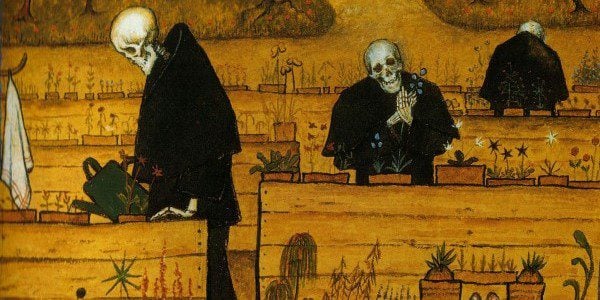As some of you know, I’ve been reading the fascinating psychologist Ernest Becker. He believed that culture is comprised in large part of various kinds of “hero systems,”pathways or methods through which people can repress, deny, or (much better) deal in healthy ways with their inner anxieties that come from being human. In particular, those anxieties are related to the awareness of their mortality. There are both good and bad hero systems, but Becker recognized that they are necessary and inevitable. Toward the end of Escape from Evil, he reflects on the question, “What is the Heroic Society?” In a passage I found to be an interesting reflection on the state of Christianity / the contemporary church, he considers why Christianity no longer functions well as a “hero system,” in particular for young people. (This makes for a nice follow-up from my recent post on the “fall of professional ministry”):
We know only too well how traditional religious heroism has given way to the hero systems of the secular societies. Today religionists wonder why youth has abandoned the churches, not wanting to realize that it is precisely because
organized religion openly subscribes to a commercial-industrial hero system that is almost openly defunct; it so obviously denies reality, builds war machines against death, and banishes sacredness with bureaucratic dedication. [People] are treated as things and the world is pulled down to their size. The churches subscribe to this empty heroics of possession, display, manipulation. I think that today Christianity is in trouble not because its myths are dead, but because it does not offer its ideal of heroic sainthood as an immediate personal one to be lived by all believers. In a perverse way, the churches have turned their backs both on the miraculousness of creation and on the need to do something heroic in this world. The early promise of Christianity was to bring about once and for all the social justice that the ancient world was crying for; Christianity never fulfilled this promise, and is as far away from it today as ever. No wonder it has trouble being taken seriously as a hero system. Even worse, as they have done all through history the churches still bless unheroic wars and sanctify group hatred and victimage (163-64).
In Becker’s view, the church today (note that he published this in 1975) does not offer itself as an avenue for healthy heroics because it has disregarded the “heroism of sainthood.” He defines this as “living in primary awe at the miracle of the created object–including oneself in one’s own godlikeness.” The church used to understand human nature better than society did: it used to understand that human beings are, to borrow from Kierkegaard, both finite and infinite, bounded and free, full of possibility and gripped by necessity. Christianity could help people face into the fears of their death by lifting their eyes above the earth. This duality (not dualism) enabled a genuine sense of the realistic possibilities of world transformation that could be effected by collective, energetic efforts toward justice and peace. Is this the situation in which we find ourselves? Can we recover it? Does it matter?
photo credit: <a href=”http://www.flickr.com/photos/12584677@N06/1362202964″>Urnes stave church</a> via <a href=”http://photopin.com”>photopin</a> <a href=”https://creativecommons.org/licenses/by/2.0/”>(license)</a>











